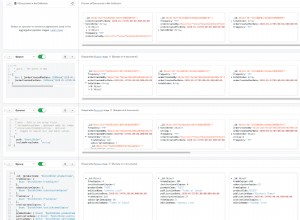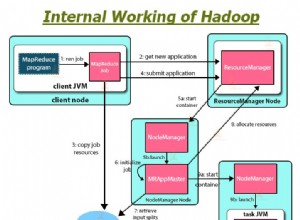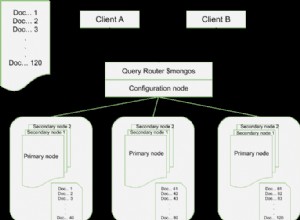मेरी पहली टिप्पणी में मैंने जिस दृष्टिकोण का उल्लेख किया था, उसके साथ यहां एकत्रीकरण है:
db.collection.aggregate( [
{
$sort: { timestamp: 1 }
},
{
$group: {
_id: null,
docs: { $push: { timestamp: "$timestamp", device_id: "$device_id", temp: "$temp", missing: false } },
device_id: { $first: "$device_id" },
start: { $first: { $toInt: { $divide: [ { "$toLong": "$timestamp" }, 1000 ] } } },
end: { $last: { $toInt: { $divide: [ { "$toLong": "$timestamp" }, 1000 ] } } }
}
},
{
$addFields: {
docs: {
$map: {
input: { $range: [ { $toInt: "$start" }, { $add: [ { $toInt: "$end" }, 900 ] }, 900 ] },
as: "ts",
in: {
ts_exists: { $arrayElemAt: [
{ $filter: {
input: "$docs", as: "d",
cond: { $eq: [ { $toInt: { $divide: [ { "$toLong": "$$d.timestamp" }, 1000 ] } },
"$$ts"
] }
}},
0 ] },
ts: "$$ts"
}
}
}
}
},
{
$unwind: "$docs"
},
{
$addFields: {
docs: {
$ifNull: [ "$docs.ts_exists", { timestamp: { $toDate: { $multiply: [ "$docs.ts", 1000 ] } },
temp: 0, device_id: "$device_id", missing: true
}
]
}
}
},
{
$replaceRoot: { newRoot: "$docs" }
}
] ).pretty()
निम्नलिखित इनपुट दस्तावेज़ों का उपयोग करना :
{"device_id": "ABC","temp": 12,"timestamp": ISODate("2020-01-04T17:45:00.000+00:00") },
{"device_id": "ABC","temp": 10,"timestamp": ISODate("2020-01-04T18:00:00.000+00:00") },
{"device_id": "ABC","temp": 4,"timestamp": ISODate("2020-01-04T18:30:00.000+00:00") },
{"device_id": "ABC","temp": 23,"timestamp": ISODate("2020-01-04T18:45:00.000+00:00") }
परिणाम :
{
"timestamp" : ISODate("2020-01-04T17:45:00Z"),
"device_id" : "ABC",
"temp" : 12,
"missing" : false
}
{
"timestamp" : ISODate("2020-01-04T18:00:00Z"),
"device_id" : "ABC",
"temp" : 10,
"missing" : false
}
{
"timestamp" : ISODate("2020-01-04T18:15:00Z"),
"temp" : 0,
"device_id" : "ABC",
"missing" : true
}
{
"timestamp" : ISODate("2020-01-04T18:30:00Z"),
"device_id" : "ABC",
"temp" : 4,
"missing" : false
}
{
"timestamp" : ISODate("2020-01-04T18:45:00Z"),
"device_id" : "ABC",
"temp" : 23,
"missing" : false
}




